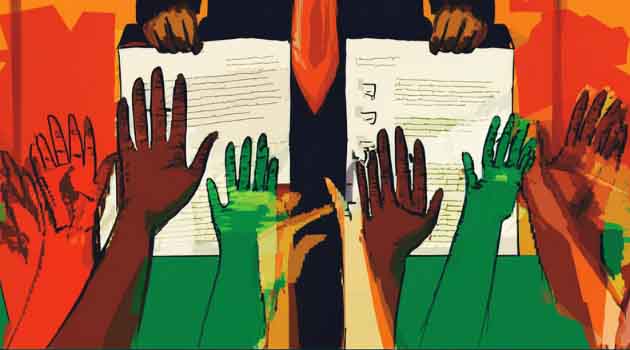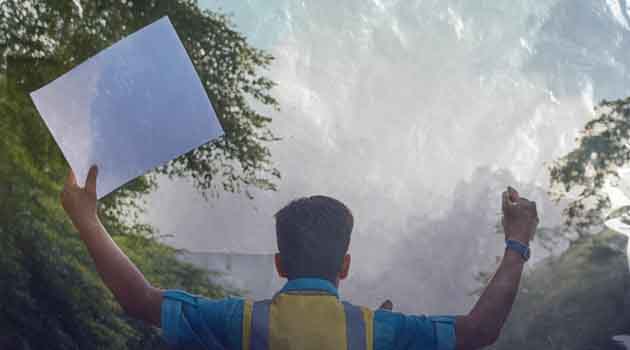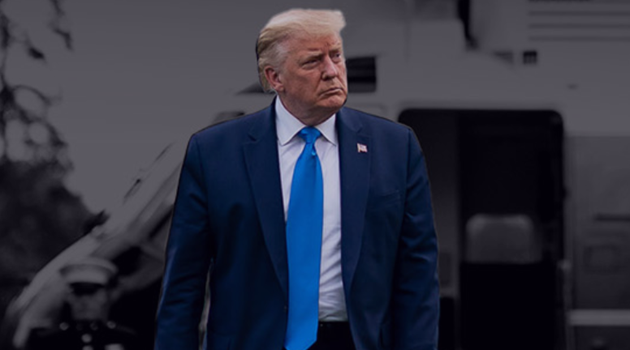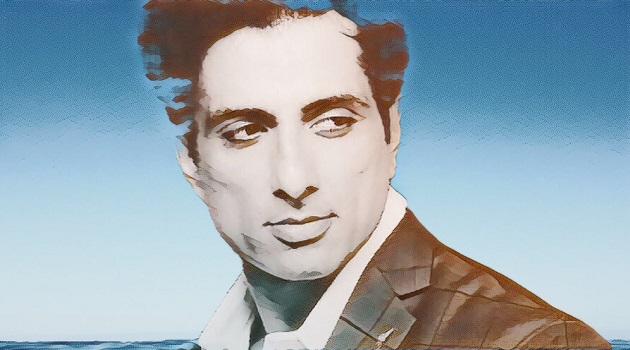In Bangladesh, the past was replayed. Prime Minister Sheikh Hasina was forced to step down once more. She was even forced to leave her country. All of these as a result of her inability to control the ongoing student protests in the nation’s capital, Dhaka.
Hasina’s dramatic fall from grace
After 15 years in power, Sheikh Hasina resigned as Bangladesh’s prime minister on August 5, 2024, under pressure from protesters. The political unrest began with student protests that demanded an overhaul of the selection criteria for civil service jobs and the establishment of a completely merit-based selection system.
Media reports said hundreds of people had entered the prime minister’s official residence in Dhaka, smashing photographs and looting furniture and belongings, while statues of her father, independence hero Sheikh Mujibur Rahman, were defaced and brought down in different parts of the country.
Although the streets initially saw celebrations from spontaneous revolutionaries, Bangladesh is now entering a perilous and uncertain phase fraught with numerous challenges.
“Despite initial scenes of jubilation displayed by accidental revolutionaries in the streets, Bangladesh is entering a dangerous and uncertain period that presents a series of challenges.” – Geoffrey Macdonald, Visiting Expert, United States Institute of Peace
Most onlookers interpreted the sequence of events as if Army had taken over the political power in Bangladesh. Truth remains that the 76-year-old Hasina, the erstwhile prime minister of Bangladesh, left her country after formal resignation in a military plane. She flew to India where she was present just a month ago for the swearing-in ceremony of her Indian counterpart Narendra Modi.
The political instability that led to her resignation has been the consequence of her own misdoings and unmaking of the Bangladesh polity. It was the result of her miscalculations about her political choice. As a matter of fact, Hasina ruined her political fortune by herself.
Hasina is the daughter of Sheikh Mujibur Rahman, the principal orchestrator of Bangladesh’s separation from Pakistan in 1971. On August 15, 1975, Hasina’s father (who had just a few months earlier become president of Bangladesh), mother, and three brothers were assassinated in their home by several military officers.
Hasina, who was out of the country when the killings occurred, subsequently spent six years in exile. During that time she was elected to the leadership of the Awami League, which had been founded by her father and had since become the largest political organisation in Bangladesh.
Reasons that led to ‘Crisis of Political Legitimacy’ in Bangladesh
Firstly, Lord Acton famous aphorism that ‘Power tends to corrupt and absolute power corrupts absolutely’ has been proved once again.
Hasina hardly ever thought Abraham Lincoln was not wrong to have admitted that democracy though is by the people; it must always exist for the people. It is above all of the people.
But the power-inebriated Hasina tried to manage politics in a manner that led to gross mismanagement. It thus gradually created a crisis of legitimacy for her power.
Secondly, rather than consolidating democracy Sheikh Hasina continuously worked for her own consolidation.
She hardly ever thought of orchestrating a viable opposition. She rather contributed towards unmaking of opposition by captivating them or crushing them with iron hand.
Obviously, that was a bad democracy for a country which has a tumultuous history of shifting hand between Army and the political leadership.
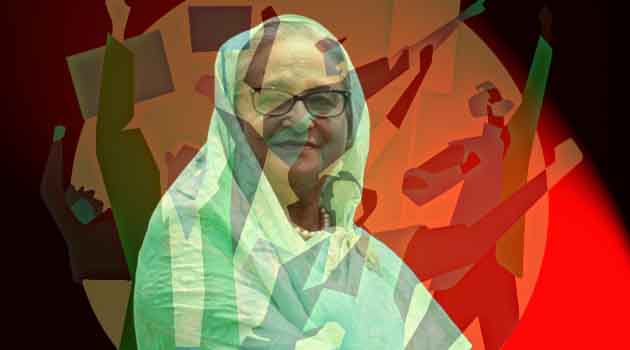
She hardly ever thought of strengthening the institutions of the State to strengthen the democracy in Bangladesh. This further perpetuated the crisis of legitimacy for her government on long-term basis.
Thirdly, she believed more in permutations and combinations of forces within democracy to maintain herself in power.
Creating reservation for generations of freedom fighters of Bangladesh was very much a part of it.
This was indeed bad politics on the part of Hasina and her party. This also sent a strong signal that judiciary in Bangladesh has capitulated to political leadership.
Once again people were aghast about the weaknesses of the most powerful state institutions within democracy i.e. Judiciary.
Fourthly, Sheikh Hasina suffered from anti-incumbency factor as she continued in power for three terms in a row that counts almost 15 years.
This is fairly a long period. Leaders can survive for long only when they continue to perform through delivering development in all walks of social, political, cultural and economic sectors of their country.
Long-term hold on power raises expectations of the people manifold. Under such circumstances, partisan politics prove disastrous against bipartisan politics. Hasina practiced more and more of partisan politics leading to crisis of legitimacy.
Fifthly, the entire episode started with the issue of reservation which was not that significant.
It was Hasina’s miscalculation and mismanagement that orchestrated her exit from the Prime Minister’s office.
She could have very well managed it following the spirit of ‘humiliation as the hallmark of learning’.
She could have rolled back the issue rather than appealing in the superior court. This further enraged the opponents and created crisis of legitimacy for her.
Sixthly, the great influx of Rohingya from Myanmar may have contributed towards unmaking of the social infrastructure in Bangladesh which her party Awami League and other members of the government failed to read.
Their role in the entire episode would be deciphered later; once the identity of those involved on the streets of Dhaka are revealed. This may also be taken as intelligence failure on part of Hasina’s government.
Seventhly, in politics one never calls spade a spade. She could have been diplomatic enough to call students anything else than ‘Razakars’ and ‘terrorists’ as they are not only derogatory but also demeaning.
She should have gauged the mood of the students and people; could have collected enough intelligence to address with the state machinery at her disposal.
She got too involved with the issue and caused herself untold damages. Once again it was her egoistic power that led to crisis of legitimacy for the system that she built.
Last and the most important, the great fiasco of her China visit provided an opportunity to opponents within to sense that an important neighbour is not in favour of happenings within Bangladesh and is unhappy about it.
They understood it quite well that India is an idealist nation-state and would not make interference within the internal affairs of the country. Hence, they counted it as an opportune moment to scale-up the crisis to its logical conclusion.
Imperatives for India
Indo-Bangladesh was passing through a phase of ‘Golden Era’ under Sheikh Hasina’s leadership. She probably paid the price for it as her opponents kept maligning her image castigating her as ‘Indian stooge’.
Under such circumstances, Indian intelligence and diplomatic enclave should have been all geared to keep a close watch on happenings within Bangladesh.
It is strong lesson for India that even small happenings must not be neglected in future; especially when a country has a checkered history of military interference in political one-upmanship.
India’s ‘Neighbourhood First’ foreign policy needs revisit. It requires to be reformed with strong doses of aggressiveness on the lines of China’s foreign policy for the neighbourhood both on land and in maritime zones.
Domestic politics must not be held hostage to the foreign policy of any country. India is at a loss and would further maximize its loss if Hasina is allowed to proceed to a different country.
India would allow it as an imperative of foreign policy as it would explore opportunities to start working with the new dispensation in Bangladesh. This would be less proper foreign policy choice for India.
Meanwhile, an interim government, led by Nobel Peace laureate Muhammad Yunus, has been sworn in and will be tasked with holding elections in Bangladesh.
Take This Home: The sudden collapse of Sheikh Hasina in Bangladesh marks a turning point in the worldwide conflict between democracy and authoritarianism.


